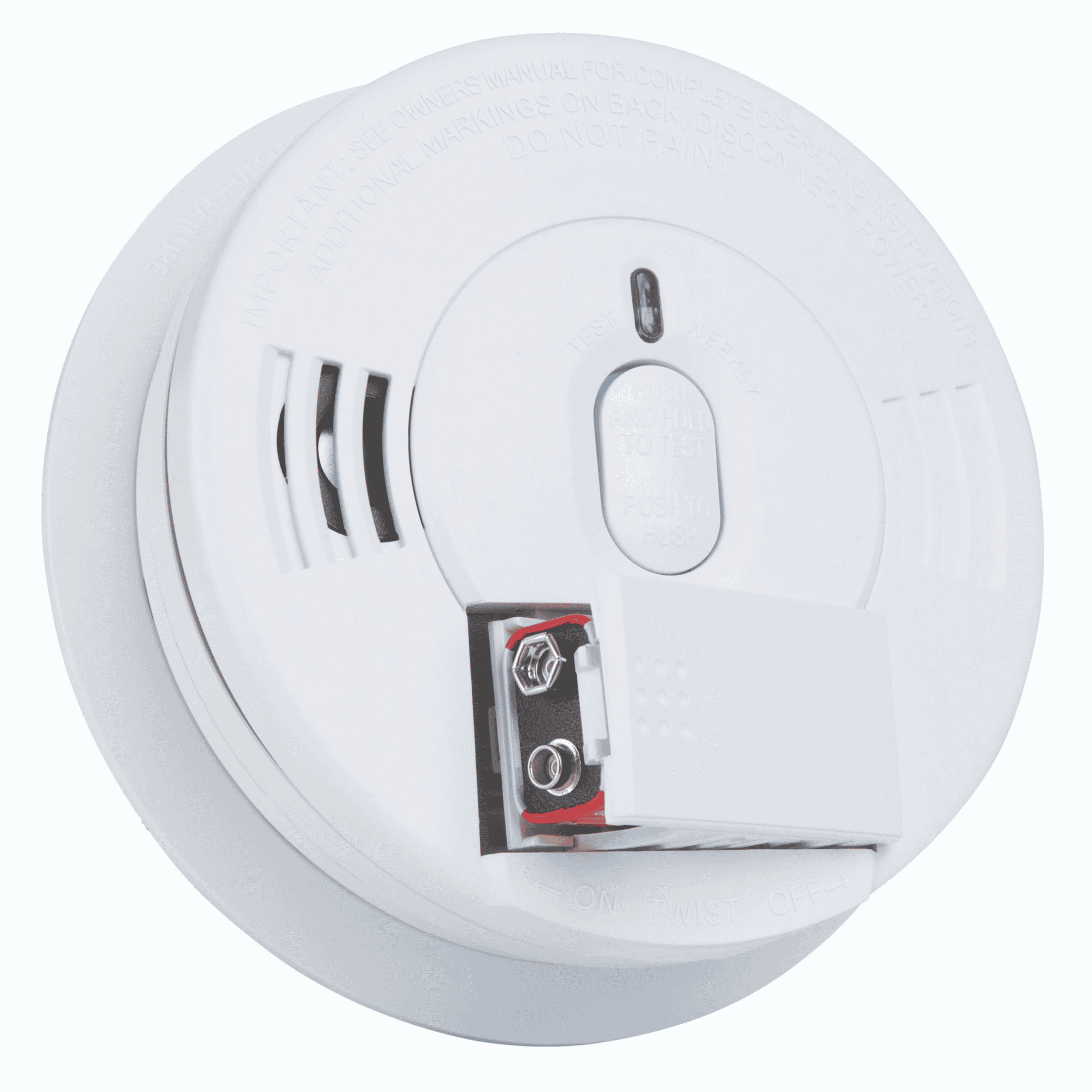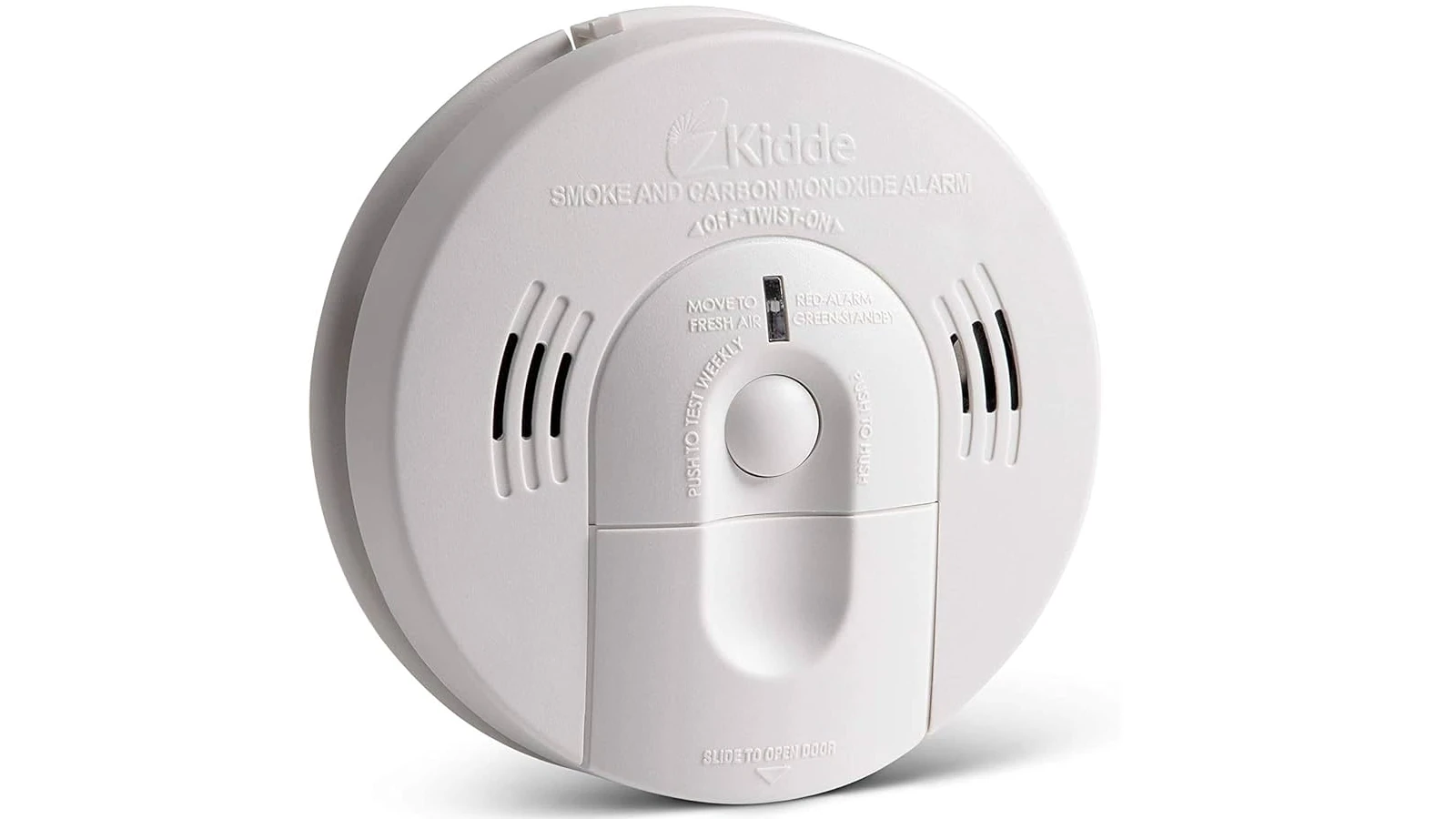Smoke alarms are important for home safety, but sometimes your smoke detector will go off when there’s no fire or smoke in the area. This can be annoying and scary, but for most hard-wired systems is actually not a big deal.
Hard-wired smoke alarms can sound for many reasons. Low batteries, dust, or power surges can make smoke alarms go off for no reason. Even steam from a shower can set them off.
Don’t ignore these false alarms. They might mean your alarm needs cleaning or new batteries. Check your alarms often to keep them working right. This will help keep you safe from real fires.
Silence the False Alarms: When Smoke Alarms Cry Wolf
Common Culprits Behind False Alarms
Smoke alarms are lifesavers, but false alarms can be frustrating. Here are common reasons why your alarm might be going off without a real fire:
- Low Battery: Most smoke alarms chirp when the battery is low. Replace the battery promptly.
- Dust and Debris: Dust, insects, or spiderwebs can interfere with the sensor, triggering false alarms. Clean your alarm regularly with a vacuum or duster.
- Cooking Fumes: Smoke from cooking, especially grilling or frying, can set off the alarm. Improve ventilation or relocate the alarm farther from the kitchen.
- Steam: Steam from showers or humidifiers can trigger the alarm. Ensure adequate ventilation in bathrooms and keep humidifiers away from alarms.
- Aerosols and Chemicals: Hairspray, cleaning products, and other aerosols can contain particles that set off the alarm. Use these products away from alarms and ventilate the area well.
- Electrical Issues: Wiring problems or power surges can cause malfunctions. If you suspect an electrical issue, consult an electrician.
- End-of-Life: Smoke alarms have a lifespan of about 10 years. Replace old alarms to avoid false alarms and ensure proper fire protection.

Troubleshooting Steps
If your smoke alarm is going off for no apparent reason, try these steps:
- Check for Smoke or Fire: Rule out any actual fire or smoke source before proceeding.
- Reset the Alarm: Press the reset button on the alarm to silence it temporarily.
- Replace the Battery: If the alarm is chirping, replace the battery.
- Clean the Alarm: Gently vacuum or dust the alarm to remove any debris.
- Relocate the Alarm: If the alarm is near a kitchen or bathroom, consider moving it to a less prone area.
- Test the Alarm: Press the test button to ensure it’s functioning correctly.
- Replace the Alarm: If the alarm continues to malfunction, it may be time for a replacement.
When to Call for Help
If you’ve tried troubleshooting steps and your alarm continues to go off without reason, or if you suspect an electrical issue, contact a qualified electrician for assistance.
Additional Tips
- Choose the Right Alarm: Opt for alarms with photoelectric sensors, which are less prone to false alarms from cooking fumes and steam.
- Regular Maintenance: Test your alarms monthly and replace batteries twice a year.
- Interconnected Alarms: Consider installing interconnected alarms, so that if one goes off, they all do, providing better protection.
Understanding Alarm Signals
| Signal | Meaning |
|---|---|
| Continuous alarm | Smoke or fire detected, evacuate immediately. |
| Chirping every few seconds | Low battery, replace the battery. |
| Occasional beeping | Other issues, refer to the alarm’s manual. |
By understanding the causes of false alarms and taking proactive measures, you can ensure your smoke alarms function properly and provide reliable protection for your home.
Identifying Common Causes for False Alarms
Hard-wired smoke alarms can go off without real danger. This happens due to different reasons. Let’s look at the main causes of false alarms.
Environmental Triggers and Maintenance Issues
Dust buildup is a common trigger for false alarms. Tiny particles can trick the sensor. Clean your alarms often to stop this problem.
High humidity can also set off alarms. Moisture in the air looks like smoke to some detectors. Use fans or open windows in damp areas.
Spiders and bugs sometimes crawl into alarms. This blocks sensors and causes false alerts. Check for pests and remove them carefully.
Regular cleaning helps prevent these issues. Vacuum around alarms monthly. Wipe them with a dry cloth every few months.

Electrical Complications and Battery Challenges
Power surges can make alarms go off for no reason. These quick spikes in electricity confuse the system.
Bad wiring is another culprit. Loose connections cause errors. Have an electrician check your alarm setup.
Backup batteries need care too. Old or weak batteries lead to false alarms. Replace them yearly or when the alarm chirps.
Some tips to avoid electrical issues:
- Use surge protectors
- Keep alarm wiring neat
- Test backup batteries monthly
External Factors and High Sensitivity
Smoke alarms can be too sensitive sometimes. This means they react to things that aren’t dangerous.
Steam from showers or cooking can set off alarms. Move alarms away from bathrooms and kitchens if possible.
Strong chemical fumes trigger false alarms too. Be careful when cleaning or painting near alarms.
Heat from fireplaces can fool nearby detectors. Place alarms at least 10 feet from heat sources.
To reduce sensitivity issues:
- Use vents in steamy areas
- Open windows when using strong chemicals
- Choose the right alarm for each room
Remember, a working alarm is crucial for safety. Don’t disable it due to false alarms. Fix the root cause instead.
Troubleshooting and Preventing Unwarranted Alarms
Smoke alarms can go off for many reasons. Regular upkeep and proper setup are key to stop false alarms. These steps can help keep smoke detectors working right.
Regular Maintenance and Cleaning Procedures
Dust can make smoke alarms go off. Clean them often with a vacuum or soft brush. Do this every 6 months.
Dirt in smoke detectors can cause false alarms. Wipe them with a damp cloth. Don’t use cleaning sprays.
Check batteries twice a year. Replace them yearly even if they seem fine. For hard-wired alarms check backup batteries too.
Test alarms monthly. Press the test button. If it doesn’t work try new batteries.
Ensuring Proper Smoke Alarm Operation
Put smoke alarms in the right spots. Keep them away from kitchens and bathrooms. Steam can set them off.
Check the age of alarms. Replace them every 10 years. Old alarms may give false alerts.
Look at the wiring for hard-wired alarms. Loose wires can cause issues. Call an expert if needed.
If alarms keep going off press the reset button. Hold it for 15-20 seconds. If that doesn’t work take out the batteries.
Check for nearby heat sources. Move alarms away from vents or lights. These can trigger false alarms.
Frequently Asked Questions
Smoke alarms can go off unexpectedly for many reasons. Here are some common questions and answers about this issue.
Why did my smoke alarm activate in the middle of the night without any signs of smoke?
This can happen due to dust or bugs in the alarm. Steam from a nearby bathroom can also set it off. Low batteries may cause false alarms too.
What causes a hardwired smoke detector to alarm without the presence of fire or smoke?
Power issues often cause false alarms. This includes power surges or dips. Dirty sensors inside the alarm can trigger it too. High humidity in the home is another possible cause.
How can I troubleshoot a smoke detector that sounds an alarm then ceases without apparent cause?
First check the batteries. Replace them if needed. Clean the alarm with a vacuum to remove dust. Look for any damage to wires. If problems continue call an electrician.
Is there a reason all my smoke detectors would trigger simultaneously without smoke?
This usually means the alarms are linked. One faulty alarm can set off the others. Power surges may trigger all alarms at once too.
What steps should I take if my hardwired smoke alarm activates sporadically?
Check for dust and clean the alarm. Look for signs of insects inside. Test the backup battery and replace if needed. Make sure the alarm isn’t near air vents or steam sources.
How do I prevent my hardwired smoke detector from false alarming?
Keep alarms clean and dust-free. Replace backup batteries yearly. Don’t put alarms near bathrooms or kitchens. Check for loose wiring. Replace alarms over 10 years old.







